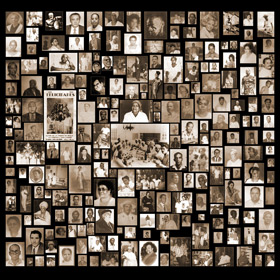Addressing the ancestors

'The motivation for this special session comes out of our recognition with the APC research intiative that the matter of ancestors emerges in a number of our research projects in ways that demand critical attention and perhaps innovations in the conceptual lexicon that we deploy in relation to ancestors and the ancestors-archive nexus,' reads the invitation.
The following quotations have been circulated to trigger ideas and debate:
'... these ruminations play havoc with a scholarly propensity to treat the ancestors as another social category, one that like children, the poor, or peasants, or... privileges a will of scholars to objectify when what is at stake is the powers of ancestors to present as subjects. For me, at the moment, the discussion of the Ancestral Dead initiates a conversation regarding the logic and sufficiency of the subjectivity/objectivity distinction.' David W Cohen, Professor Emeritus of Anthropology and History at the University of Michigan (Ann Arbor)
'Ndwandwe descendents must have been able to continue propitiating their ancestors, calling on them to look after the living, reporting family ceremonies, and making all such ritual observances. In the policy of manipulating existing knowledge and practices, to insert new content into old forms of social, cultural and political practice, the new rulers would not have forced the discontinuation of the addressing of kinship group and family ancestors in ceremonies and rituals that were specific to lineages. Thus, like all the other subjugated kinship groups, the Ndwandwe would have been able to continue their observances, not as rituals of state, but as private family practices.' Mbongiseni Buthelezi
'...the ancestors escape consignment in the category of primitive religion, or display as fetishes in ethnographic showcases, to burst into a conversation of recognition across language, race, and age, across the private and the public. On the pages of Facebook and in beachfront conversation, we see local self-understandings in the making, as we know them, in fact, always to be. We see the past in the present in a way that simply cannot be encompassed by notions of tradition and ethnic politics. Here the ancestors and the past seem better bracketed in a conversation about zen and kharma, breathing deeply and living green. If we change our lenses and augment ideas of ethnic identarianism with the local historical sensibilities, we might see even in the political-economy of the claims on kingship, underlying impulses about new-very ancient-engagements with the past.' Carolyn Hamilton
'To introduce [the Krige archive], I try to paint my conception of what an Ancestor Archive might be, framing the Krige archive as an ancestor archive and doing this by exploring the complex of Ho Phasa, which is a ritual event used to placate the ancestors as a cure for the violent potential inherent in their archive. Imagining Ho Phasa around a collaborative polarity between Ditaola (the doctor/diviver's divination bones) and Dithugula (historical or sacred object/thing possessed by a family), polarity in need of mediation or conducting whose aim is to circulate knowledge housed under the Ancestor Archive. Mostly I introduce the idea of the said archive
as Dithugula tša Malefokwane, framing the photographic as sacred objects/things of the Kriges and Balobedu, who I see as the common ancestors to the knowledge inherent in this archive. And carve out a space for the invention of Motshwara Marapo; that character that conducts the space in between.' George Mahashe
The agenda for this discussion will be open and loose.
If you are interested in attending, please RSVP to Marcelle Faure at marcelle.faure@uct.ac.zaand will you receive an email with a variety of preparatory materials for reading in advance.